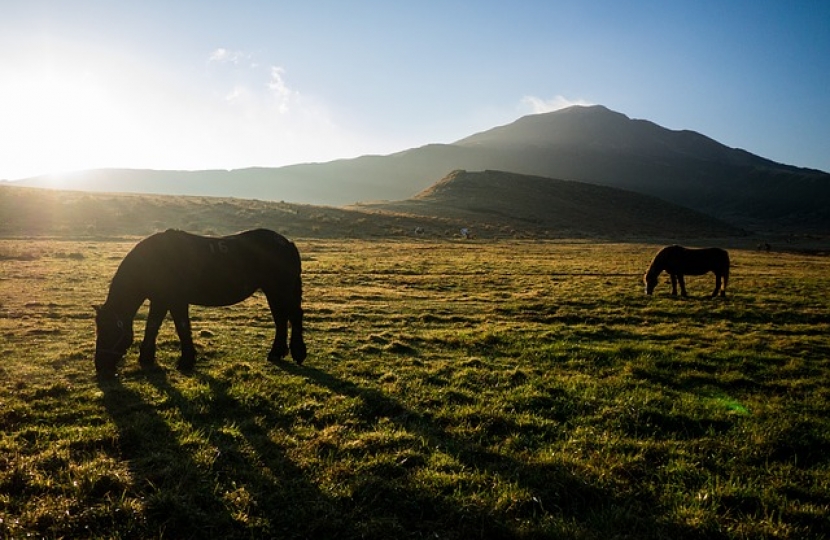
Dozens of MPs from across the political spectrum gathered in Westminster Hall on Tuesday 26 November to discuss the problem of the fly-grazing of horses in a debate initiated by East Hants MP, Damian Hinds.
The practice of leaving horses to graze on public or private land without permission has been common across England and Wales. Last month the Welsh government brought forward proposals to control fly-grazing, and there are concerns that without similar initiatives being implemented in England there will be a displacement of the problem over the border.
East Hampshire has experienced its own problems with fly-grazing, with 46 horses having been found recently in a field in Alton. Shortly after their owner removed them, another 18 horses appeared in the same field. Redwings Horse Sanctuary, which took in some of the original 46, describes the condition of two of them as follows:
“We very tragically lost Georgiana, only two weeks after her rescue. Georgiana was suffering with salmonella - which several of these horses have - and also an horrendous small redworm burden. Mr. Darcy is also an orphan foal and must have lost his mother at Alton. He was so hungry that he had actually been chewing the tails of the other horses in the group.”
No one knows exactly how many horses are affected but the RSPCA estimate 7,000 are at risk of neglect, with upwards of 3,000 being fly-grazed at the present time. Damian listed four senses in which fly-grazing is a grave issue: the condition of the horses themselves, which suffer neglect and malnutrition; the theft of farmers’ livelihood – where grazing is unauthorised, it is theft; the burden on those who have to enforce the law, and for the charities that care for the horses; and the public safety risk, if for example horses break onto the road.
Damian described how the process typically goes once a farmer finds horses on his land: The farmer calls the local authority. The local authority comes to check the horses, often finding that there is no microchip to trace the owner. The local authority puts up a notice to say, “Contact us if these horses are yours” – the owner then has two weeks to come forward. Just before the two weeks are up, the horses may just be removed from the field by their owner at night, to be moved somewhere else. If the horses do not disappear and no one comes forward to claim them, the only option for the local authority is to auction them, having first documented and microchipped them. The horses are then often actually bought back by their original owner, who now benefits from having a more valuable, microchipped horse.
With a great imbalance between supply and demand, horses have been known to change hands at auction for as little as £5.
Damian called for a number of changes, some of which could require legislative action:
- More enforcement is needed to make sure horses are microchipped.
- The removal of horses must be more straightforward, including reducing the wait time from 14 days to perhaps seven.
- The cycle of horses being seized, auctioned and then bought back by their original owners must be broken; there must be options for rehoming and in the worst cases and where unavoidable, for euthanising.
In response, Parliamentary Under-Secretary, George Eustice, reiterated the measures that are already in place to tackle fly-grazing: the Animals Act 1971, the Highways Act 1980 and section 9 of the Animal Welfare Act 2006.
The Minister also explained the impact of new legislation on fly-grazing:
“The Anti-social Behaviour, Crime and Policing Bill is currently before Parliament and, when enacted, will provide enforcers with new and much more flexible powers to tackle antisocial behaviour in all its forms, including the act of leaving a horse on someone else’s land ... If a person is identified as having left their horse on someone else’s land without permission, the local authority or police could issue a community protection notice ... The notice might require the individual to remove or even to sell the horses. Failure to abide by a community protection notice is a criminal offence, and anyone who does so may face a fine or other sanctions.”
Damian Hinds said:
“I was grateful for the opportunity to introduce a debate on this issue given the terrible case we had in Alton. With the Welsh government introducing legislation to tackle the issue, the need for us to find a solution in England is pressing.
“It was important to hear from the numerous other MPs in the debate how widespread the problem is – in both rural areas and urban, horses are being left on local authority and private land throughout the UK.
“I hope that this debate is just one in a series of moves in Parliament to address this problem and indeed I am aware that the government is meeting again soon with equine charities. The most important thing is to monitor what happens as a result of the Welsh legislation and see what more needs to be done in England.”
The full text of Damian’s speech can be found here: http://www.publications.parliament.uk/pa/cm201314/cmhansrd/cm131126/halltext/131126h0001.htm#13112647000002

